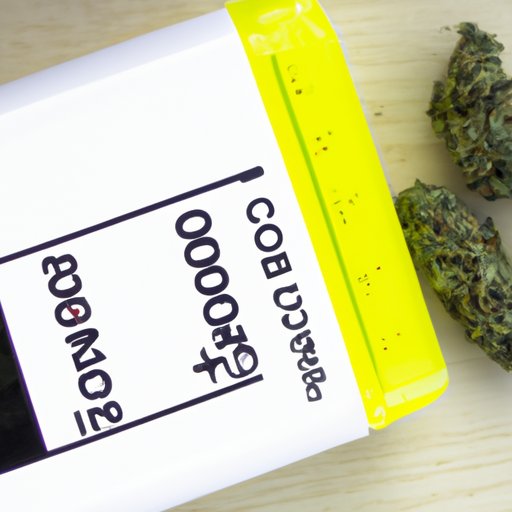Introduction
Cannabis, commonly known as marijuana or weed, is the most widely used illicit drug in the United States. It contains a psychoactive compound called tetrahydrocannabinol (THC), which is responsible for producing the “high” associated with smoking or consuming it. As a result, many employers and organizations use drug tests to detect THC in potential employees or members.
So, how long does weed stay in your system? In this article, we’ll explore the science behind drug testing and detection times to gain a better understanding of how long THC remains in your body.
Analyzing the Science: How Long Does Weed Stay in Your System?
When it comes to drug testing, there are three main methods used to detect THC in someone’s system: urine tests, blood tests, and hair tests. Urine tests are the most common type of drug test, and they can detect THC for up to 30 days after last use. Blood tests can detect THC for up to 24 hours after last use, while hair tests can detect THC for up to 90 days after last use.
To understand why these detection times vary, it’s important to examine how THC is metabolized in the body. When THC is consumed, it enters the bloodstream and is slowly broken down by enzymes in the liver. This process produces metabolites, which are then excreted in urine, blood, and hair.
The half-life of THC is estimated to be about three days, meaning it takes about three days for the amount of THC in the body to be reduced by half. This means that THC can remain in the body for up to 30 days, depending on a person’s metabolism and other factors.
Exploring Factors That Affect How Long Cannabis Stays in Your Body
There are several different types of drug tests, each with their own detection times. Urine tests are the most common type of drug test and they can detect THC for up to 30 days after last use. Blood tests can detect THC for up to 24 hours after last use, while hair tests can detect THC for up to 90 days after last use.
Other factors can also influence how long THC remains in the body. Frequency of use is an important factor, as heavy users tend to have higher levels of THC metabolites in their system compared to occasional users. Metabolism can also play a role, as people with slower metabolisms may retain THC for longer periods of time.
Breaking Down the Difference Between Short-Term and Long-Term THC Detection
Drug tests can detect THC in the short-term and long-term. For short-term detection, urine tests are the most accurate, as they can detect THC for up to 30 days after last use. Blood tests are also effective for short-term detection, as they can detect THC for up to 24 hours after last use.
For long-term detection, hair tests are the most accurate, as they can detect THC for up to 90 days after last use. Urine tests can also detect THC in the long-term, but not as accurately as hair tests. It’s important to note that hair tests are not always available, so if you need to take a drug test, it’s best to consult with your doctor or employer to find out what type of test will be used.
Conclusion
In conclusion, the amount of time that weed stays in your system depends on several factors, including frequency of use, metabolism, and type of drug test used. Urine tests are the most common type of drug test and can detect THC for up to 30 days after last use. Blood tests can detect THC for up to 24 hours after last use, while hair tests can detect THC for up to 90 days after last use.
It’s important to remember that even though THC can remain in the body for up to 30 days, the amount of THC present decreases over time. With enough time, THC metabolites will eventually leave the body completely. If you’re worried about failing a drug test, it’s best to talk to your doctor or employer about what type of test will be used and how long THC is likely to remain in your system.
(Note: Is this article not meeting your expectations? Do you have knowledge or insights to share? Unlock new opportunities and expand your reach by joining our authors team. Click Registration to join us and share your expertise with our readers.)
